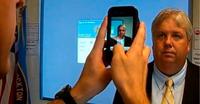-
Google acquires facial biometric company
Following Facebook’s decision to implement biometric facial recognition software, Google has acquired a company to boost its facial recognition capabilities; the search giant recently purchasd Pittsburgh Pattern Recognition (PittPatt), which develops technology that can search images and videos for a specific face
-
-
U.K. airports install biometric passport readers
Individuals with biometric passports from the United Kingdom or the European Union will now be able to use sophisticated automated e-Passport scanners at every major U.K. airport
-
-
Safran completes L-1 acquisition, becomes world’s biometric leader
In the latest series of purchases by traditional defense firms seeking to diversify their portfolios, French defense company Safran recently completed its $1 billion acquisition of biometric solution provider L-1 Identity Solutions making it the world’s market leader in biometrics
-
-
Portable biometric system for police officers

Police now have a new low-cost, portable biometric tool in their arsenal to quickly and accurately identify a suspect: an Apple iPhone; using MORIS (Mobile Offender Recognition and Information System), an app developed by BI2 Technologies, police officers can now use an Apple iPhone to scan a suspect’s fingerprint or snap a photo of their face to scan their iris
-
-
Detecting fake Web sites

A team of researchers develop a new — and more reliable — way to detect fake Web sites; the team developed five categories with thousands of cues, finding that the best results were attained when utilizing thousands of highly visible and also deeply embedded cues, such as placement, URL length, the number of links, characters types on the site and how thorough the site’s “frequently asked questions” section is detailed, among other features
-
-
Growing problem in Canada: stolen passports
On average, 1,000 Canadian passports are stolen across Canada every month; in FY2009-10, 13,077 passports were stolen in Canada; by comparison, only 631 were swiped overseas; another 47,704 passports were reported lost in Canada; late next year, Passport Canada will begin distributing e-Passports to the general public
-
-
Law enforcement and privacy concerns in Vancouver
Last month, the police in the otherwise sedate Vancouver had to use tear gas, pepper spray, and flash bombs in downtown Vancouver to try to disperse angry rioters who set cars on fire, looted stores, and taunted police officers after the Canucks’ 4-0 Stanley Cup final loss to the Boston Bruins; the police wants to use facial recognition technology to identify the rioters, but privacy advocates are worried
-
-
Law enforcement and privacy concerns in Massachusetts
Massachusetts has a plan: create a database which could map drivers’ whereabouts with police cruiser-mounted scanners that capture thousands of license plates per hour — and store that information indefinitely so local police, state police, federal agencies, and prosecutors could access it as they choose; privacy advocates are worried
-
-
Sector Report for Tuesday, 19 July 2011: Authentication / Biometrics
This report contains the following stories.
Plus 1 additional story.
-
-
U.S. troops deploy biometrics in the field
Biometric databases in Iraq and Afghanistan are helping U.S. troops combat violent insurgents; in an ambitious move, troops have sought to capture iris scans, facial photographs, and fingerprints from men of fighting age especially those who have been detained for insurgent or terrorist ties.
-
-
Biometrics for Indian cabs
Officials at India’s New Delhi International Airport will soon begin using biometrics to monitor taxi drivers; the move comes after a Saudi businessman was abducted and murdered by two cab drivers in 2008
-
-
L-1 Identity, Safran merger given green light
The Committee on Foreign Investment in the United States (CFIUS) recently gave the go ahead to French defense firm Safran SA to close its bid for L-1 Identity for $1.6 billion
-
-
New tools identify a person's expression, estimate their mood

Biometrics company releases software that allows users to “cartoonize” photos; cartoons aside, the company announced the release of more free API (application programming interface) face detection tools: the service can identify a person’s expression as well as estimate their mood
-
-
Sector Report for Tuesday, 5 July 2011: Authentication / Biometrics
This report contains the following stories.
Plus 1 additional story.
-
-
Better than SecurID?
The man who invented the two-factor authentication SecurID token has just unveiled a more secure authentication system using voice biometrics; Kenneth Weiss, the founder of Universal Secure Registry, says his latest invention is more flexible and secure than SecurID tokens as they can be used to authenticate individuals on mobile phones, payments, and cloud computing; by adding a voice biometric component, the new device offers three-factor authentication
-
- All
- Regional
- Water
- Biometrics
- Borders/Immig
- Business
- Cybersecurity
- Detection
- Disasters
- Government
- Infrastructure
- International
- Public health
- Public Safety
- Communication interoperabillity
- Emergency services
- Emergency medical services
- Fire
- First response
- IEDs
- Law Enforcement
- Law Enforcement Technology
- Military technology
- Nonlethal weapons
- Nuclear weapons
- Personal protection equipment
- Police
- Notification /alert systems
- Situational awareness
- Weapons systems
- Sci-Tech
- Sector Reports
- Surveillance
- Transportation
Advertising & Marketing: advertise@newswirepubs.com
Editorial: editor@newswirepubs.com
General: info@newswirepubs.com
2010-2011 © News Wire Publications, LLC News Wire Publications, LLC
220 Old Country Road | Suite 200 | Mineola | New York | 11501
Permissions and Policies
Editorial: editor@newswirepubs.com
General: info@newswirepubs.com
2010-2011 © News Wire Publications, LLC News Wire Publications, LLC
220 Old Country Road | Suite 200 | Mineola | New York | 11501
Permissions and Policies
